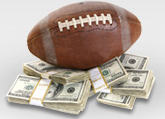
The iconic twin spires of Churchill Downs, home of the Kentucky Derby. Credit all photos: Churchill Downs
According to Churchill Downs Racetrack general manager Ryan Jordan, up until last year cellular connectivity was a pain point at the historic facility, which opened in Louisville, Ky., in 1875. Though recently cellular providers tried to address the smartphone crunch by bringing in technology like COWs (cellular towers on wheels), the spread-out nature of the track and its architectural challenges made the COWs an unsatisfactory solution.
“The temporary COWs really couldn’t handle the traffic,” said Jordan in a recent phone interview. In post-race surveys, he said, the track heard complaints about connectivity, as did the cellular carriers.
“We heard it [the complaints] and the carriers heard it,” Jordan said. “But we never had a solution to handle the problem.”
In 2013, however, Churchill Downs enlisted infrastructure provider Mobilitie to deploy a neutral-host DAS to bring better cellular connectivity to the entire facility. While the deal was struck too close to last year’s race to allow for a full buildout, by this year’s 140th running of the “Run for the Roses,” a full-scale, 253-antenna DAS was in place to produce some winning results. According to AT&T, the Churchill Downs DAS carried event-record traffic over the Kentucky Derby and Kentucky Oaks weekend, with a total of 2 Terabytes of overall traffic and a peak hour of 180 Gigabytes of traffic, in the 60 minutes just before the Derby race on May 3.
By comparison, during the most recent Super Bowl at MetLife Stadium in New Jersey, AT&T saw a peak hour of 119 GB of traffic before kickoff, and 624 GB of total traffic on game day. Of course, some of the specifics of the Kentucky Derby make the big numbers easier to understand, including the 160,000 fans on race day as well as the full day of attendance, which featured less than a half-hour total of actual horses running fast. It’s important to note that the Derby figures are for AT&T traffic only, and do not include any potential traffic from Verizon Wireless customers, whose carrier also used the Mobilitie DAS to improve reception at the track.“Derby Day is 13 races, each about 2 minutes long,” Jordan said. “When you figure out that the gates open at 8 a.m. and the Derby doesn’t start until 6:30 p.m., that’s almost 12 hours [of fans in attendance] and only 26 minutes of action.”
In other words, there’s a lot of time for selfies and other Internet activity.
Bucket list pictures, and race handicapping
Like the Super Bowl and other big sports events, the Kentucky Derby is a “bucket list” type of happening, one made even more receptive thanks to the see-and-be-seen nature of the event.
“People spend a lot of time taking in the things that make [the Derby] special, like hats, fashions, and the singing of ‘My Old Kentucky Home,’ ” Jordan said. “It’s the kind of event where people take pictures and send them to their friends to show them what they’re missing.”
Jordan said that in addition to social media activities, many fans at the track used the new DAS connectivity to try to improve their betting odds, using the Internet to help them handicap the races. (Churchill Downs also has a small amount of public Wi-Fi available only in the main building, used mainly to support an on-site mobile betting application.)
In previous years, fans at the event might not have been able to perform all those wireless functions. If the decision to upgrade the communications was an easy one, the decision to go with a “neutral” third party partner like Mobilitie came from a desire to serve all wireless customers equally. Though wireless carriers like AT&T and Verizon can and do act as lead contractors for many DAS deployments, the negotiations to get each carrier what it wants in terms of antenna deployments and other technology needs can get complex in a hurry.
“We know how to put on a great event,” said Jordan of the Derby’s owners and operators. For communications, Jordan said, the track sought out a firm with an equal amount of smarts and reputation in their field.
“We wanted to find someone who was an expert in the conversations [with carriers],” Jordan said, “and to make sure our system could cover as many of our fans as possible.”
Old buildings a challenge for new technology
Among the challenges encountered by Mobilitie at Churchill Downs were some structures dating back to the 1890s, including the iconic twin spires structure, which Jordan said dates back to 1895.
“Some areas have a lot of concrete and steel, and then there are seating areas open to the outside with enclosed dining rooms behind them,” Jordan said. “There were a lot of things for Mobilitie to design around, and it wasn’t easy for them. But walking around the facility, you don’t see a lot of large antennas. Everything is pretty discreet. We’re very pleased with Mobilitie. It was a great win for us.”








